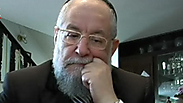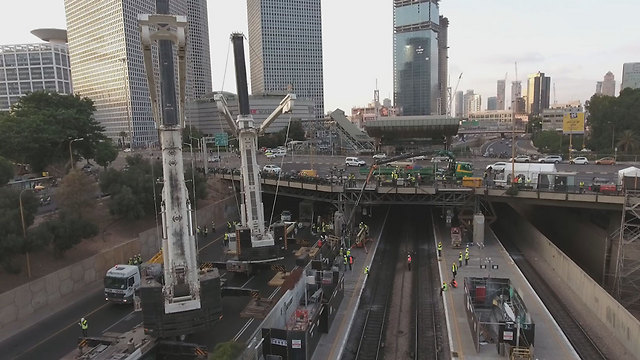
Point/Counterpoint: Should train renovation work be permitted on Shabbat?
Tel Aviv Rabbi Yisrael Meir Lau says allowing work on Shabbat could lead to a slippery slope, arguing that even Tel Aviv's first mayor Meir Dizengoff was against the public desecration of Shabbat; journalist Yaron London thinks new interpretation needs to be given to the term 'Pikuach Nefesh' to include those dangers that are not immediately obvious.
Rabbi Yisrael Meir Lau: Learn from Dizengoff
If stores are opened 365 days a year, the people of the Book would become a nation of hagglers, whose entire life is a relentless pursuit of wealth.
The Shabbat day is a wonderful gift we had received in the Ten Commandments and have given to all of humanity. Many Jews have lost their lives for the sanctity of the Shabbat because, after all, a value worth dying for is most certainly a value worth living for. Even in the most civilized of nations, businesses are opened only six days a week, and the pursuit of wealth stops for one day every week.
This weekend we faced the issue of whether to allow train renovation work on the Ayalon Highway during Shabbat. Eventually, it was decided that only work considered "Pikuach Nefesh" (saving a life) will be done on Shabbat and work that isn't—will be postponed. Indeed, "Pikuach Nefesh" is something that is very important in Jewish tradition, but we must determine whether the works are indeed "Pikuach Nefesh." I have a feeling that on this matter, we are holding the stick at both ends.
We must think of the small business owners, who will be deprived of their livelihood completely when the Shabbat desecraters sell food products on Saturdays and holidays. We must also think of the many Jews who are Shabbat observers and would not be able to work in the hundreds of businesses that would be opened on Shabbat. This is serious discrimination and constitutes an exclusion of the religious public from the workforce.
My heart goes out to the thousands of children who have to spend their days off from school on Saturdays and holidays without their mom and dad, because the parents have to go to work to line the pockets of store owners instead of spending quality time with their children.
The first settlers of Tel Aviv-Jaffa developed a respectable conduct, worthy of our nation's tradition. The title of city notice number 36 from the Tel Aviv municipality is: "Against the desecration of Shabbat in public." The noticed, signed by the city's first mayor Meir Dizengoff, detailed the decision made: "All stores and places of entertainment must be closed from Shabbat eve to its termination."
"Remember," Dizengoff writes, "Shabbat is our most amazing sign of national solidarity from generation to generation, and anyone who undermines it undermines the unity of Israel ... Preserve the Shabbat, and it will preserve us."
Dizengoff was not an observant Jew, nor was Ahad Ha'am (Hebrew essayist Asher Zvi Hirsch Ginsberg), who wrote: "More than Jews have kept Shabbat, Shabbat has kept the Jews."
Our first prime minister, David Ben-Gurion, barred the operations of the train on Shabbat across the country, out of the understanding that the "status quo"—a Latin, non-Halachic term—must be maintained. The way the "status quo" was interpreted was: maximum Judaism in public life, minimum interference in private life. This is also the difference between public transportation and private transportation on Shabbat. We have to at least preserve this status quo, as the image of a Jewish state is alarmingly eroding.
Such was the first Hebrew city that in so doing served as a vanguard for many cities in Israel. Please, heed these words, and don't lend a hand to the destruction of Shabbat and holidays.
Rabbi Yisrael Meir Lau is the chief rabbi of Tel Aviv-Jaffa.
Yaron London: Halacha commentators
I live in central Tel Aviv. In order to get from Israel's hub to my workplace in Givatayim, some five kilometers away, I waste 40 minutes per direction—a total 80 minutes a day. Of course, those commuting from afar and having to enter the crowded city every day are suffering much more than I do. They are forced to cut short their night's rest and tarry in their return home.
Who could put into numbers the overall cost of two million people stuck sitting in the motored steel-and-plastic boxes? The light rail works, which are set to continue for some years hence, ensure that the situation won't change much. It is possible, however, that widening that bottleneck at the HaShalom Junction will slightly mitigate the situation.
Nonetheless, I am not disregarding the claims of those protesting work on Shabbat. I am merely suggesting that the issue of the public observance of Shabbat is worthy of being discussed without extortion in governments constantly threatened by their ultra-Orthodox partners.
Two governments crumbled over this issue: Yitzhak Rabin's government collapsed in 1976 because new fighter jets arrived from the United States on Shabbat eve, and the coalition formed by Ehud Barak was weakened and then came to naught shortly thereafter in 1999 because of a transfer was done on Shabbat of a massive installation for the Israel Electric Corporation.
I believe that the solution lies in the hands of courageous Halacha commentators who will give a new, daring interpretation to the Halachic law regarding "Pikuach Nefesh," which states that the preservation of human life overrides virtually any other religious consideration. They must understanding that in a modern society whose parts are closely dependent upon one another, "Pikuach Nefesh" doesn't just mean a clear and immediate danger to one's life, or a state of emergency, but also dangers that are much more complex and harder to see, those that only come to light following a statistic analysis that determines there is a bloody price to the defective functioning of social systems.
Enlightened rabbis should understand that the quality of transportation in a densely populated country is a question of life and death. Not just with regards to the speed of emergency vehicles, but also to the time spent on the road, which exacts hidden costs: Car accidents, a waste of time that translates into a lot of money taken out of life-saving investments, the burning of suffocating fuel, air pollution, and irritation.
The Rambam (preeminent medieval Sephardic Jewish philosopher and astronomer Moshe ben Maimon) determined that: "The Torah's laws are not to bring revenge into the world, rather they are to bring mercy and grace and peace into the world." Perhaps the war over the Derech HaShalom ("Road of Peace" in direct translation) junction could serve as an introduction to this serious discussion.











